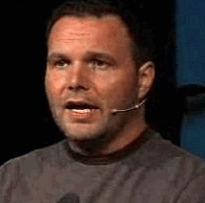“Does God Really Not Like Me?”
 Just before the Christmas holiday I wrote a piece on Christ as “God with us”. I’ve been mulling that idea over in my mind through endless renditions of Silent Night and Hark the Herald Angels Sing I’ve heard shopping at the mall this last month.
Just before the Christmas holiday I wrote a piece on Christ as “God with us”. I’ve been mulling that idea over in my mind through endless renditions of Silent Night and Hark the Herald Angels Sing I’ve heard shopping at the mall this last month.
Not just that God is with us in that he became human, but that God is with us…he’s for us…he’s on our side. (Well, actually we get to be on his)
It’s always sad for me to meet Christians that live as if God was against them rather than with them. They live their lives in a constant battle to keep God appeased and pleased with them… then feeling guilty and ashamed when they don’t.
A lot of the Neo-Reformed movement focuses us on the “depravity” of our human nature. This has led to a distorted relationship with God and a misunderstanding of who we are as his children. You then get leading evangelical figures like Mark Driscoll proclaiming in a recent sermon:
“Some of you, God hates you,” he said. “Some of you, God is sick of you. God is frustrated with you. God is wearied by you. God has suffered long enough with you. He doesn’t think you’re cute. He doesn’t think it’s funny.”
“But [understanding that God hates you] is the beginning of freedom.”

I rather suspect that Mr. Driscoll is revealing his heart rather than God’s. What father would speak that way to his son or daughter? In the end we start to look like better parents than God.
It’s easier to understand where Driscoll is coming from when you understand in reformed theology (which underpins a large portion of evangelicalism) the first statement you are taught is that God sees you as “totally depraved”. And because of this vile state God’s wrath against you is deflected only by the righteousness in Jesus that you receive when you believe in him. Hence the high priority given to evangelism focused on a confession to “believe in Jesus”… so that God doesn’t hate you anymore.
But can you imagine me going up to my 15 year old son and saying, “Gabriel, I hate you. The very essence of your being is a stench in my nostrils but, because of your mother’s love for you, I’ve decided to love you too…so come over here and give daddy a big hug.”
Could the reason evangelicalism has appeared so psychotic lately is that we’ve made God psychotic? God creates us in his image and so we decide to return the favor?
No, I have Good News (Gospel) for you: God doesn’t hate you, he is for you and not against you.
For God did not send his Son into the world to condemn the world, but to save the world through him.
John 3:17
“Ah, but Steve,” you say, “continue reading and you’ll get the context. Anyone who doesn’t believe in Jesus is already condemned.”
Ok, let’s take a look…
Whoever believes in him is not condemned, but whoever does not believe stands condemned already because they have not believed in the name of God’s one and only Son.
John 3:18
Yes, it seems you could be right. God could be condemning people who don’t “believe in the name of God’s one and only son.” But what does it mean to believe in God’s one and only son? Is it a “repeat after me” prayer asking Jesus into your heart at a church alter? Is it faithful Sunday service attendance? Is it reading one chapter of the Bible a day, or perhaps a chapter of The Purpose Driven Life?
What does it really mean to “believe in the name of God’s one and only son”.
Let’s keep reading what John has to say…
This is the verdict: Light has come into the world, but people loved darkness instead of light because their deeds were evil. Everyone who does evil hates the light, and will not come into the light for fear that their deeds will be exposed. But whoever lives by the truth comes into the light, so that it may be seen plainly that what they have done has been done in the sight of God.
John 3: 19-20
The verdict, meaning the legally binding decision, is that belief in God’s son is demonstrated by a certain redemptive lifestyle. One in where belief in Christ is displayed by having no love for darkness and embracing the light that reveals wherever darkness is hidden. One who seeks to bring light and truth is “believing in the One who brings Light and Truth”.

To paraphrase The Grinch, “Perhaps belief in Jesus doesn’t come from professing some lore, perhaps belief in Jesus means just a little bit more!
It makes me wonder who has not yet confessed Christ yet on their lips and yet believe him in their heart as opposed to how many quickly boast of a confession in Jesus and yet love the darkness?
Just asking…
4 comments
Comments are closed.

Beautiful. He is for us and Never against us! Our ever present help!
Heh, if there were a devil, he really couldn’t do better than Mark Driscoll. Destroying the hearts of many believers while the unbelievers turn away in disgust – and all in Jesus name!
Your father point is well taken. Why would we think that any divine being, who didn’t at least have the traits of a good human father, would be worth our time?
You mentioned that evangelicalism largely starts with the idea that we are depraved sinners awaiting judgement from a God that hates us and that this depicts us humans as a better parent than God, because what parent would say to their child that they hate them?
I think that this reveals a much larger question:
Reformed theology says that we’re not children of God until be believe in Jesus, only THEN are we adopted and loved by God with the love of a father. Until then, we only have “common grace.” God is so good, he will essentially give sinners the leftovers of his goodness that was really meant for those that are Christians. I’ve heard a sermon by Matt Chandler (Chairman of Acts 29 Ministries) start by saying that you are not a child of God until you believe in Jesus. Period.
You’re starting point is that all people are children of God and thus God loves all people as a father would his child.
Admittedly, this is a huge struggle for me. Both can’t be right and while I long for the second proposition to be true, there is a lot of scripture evidence for the first to be. This has caused a lot of confusion and heartache for me.
Would you mind commenting on this Steve? Could you help me with this struggle?
Hi Mike,
That is a REALLY good question! I readily admit there are Bible verses that seem to infer that we are God’s children only after we come to Christ (Romans 9:8) but there are also verses that indicate we are all God’s children (Acts 17: 28-29). This were the “Bible Wars” start. One side has their verses to back their view while the other side has theirs. I think we must look at this issue through the lens of Christ. When he was interacting with corrupt officials, adulterous women, or other sinners…was he displaying an attitude towards them that they were “Children of wrath” or “Children of God”? I believe we are ALWAYS children of God but we don’t always walk in that identity. The parable of the prodigal is a perfect example of this. When the son is living a life of sin, he wasn’t any less his father’s son but one could argue he was living a life as a “Child of wrath”. When he comes into his proper identity, he simply begins living the mantle of “child” that he always had but had chosen to deny.
I think that is my issue with the reform theology…it doesn’t see us with the eyes of a parent that I believe God sees us as and is confirmed by the actions an ministry of Jesus